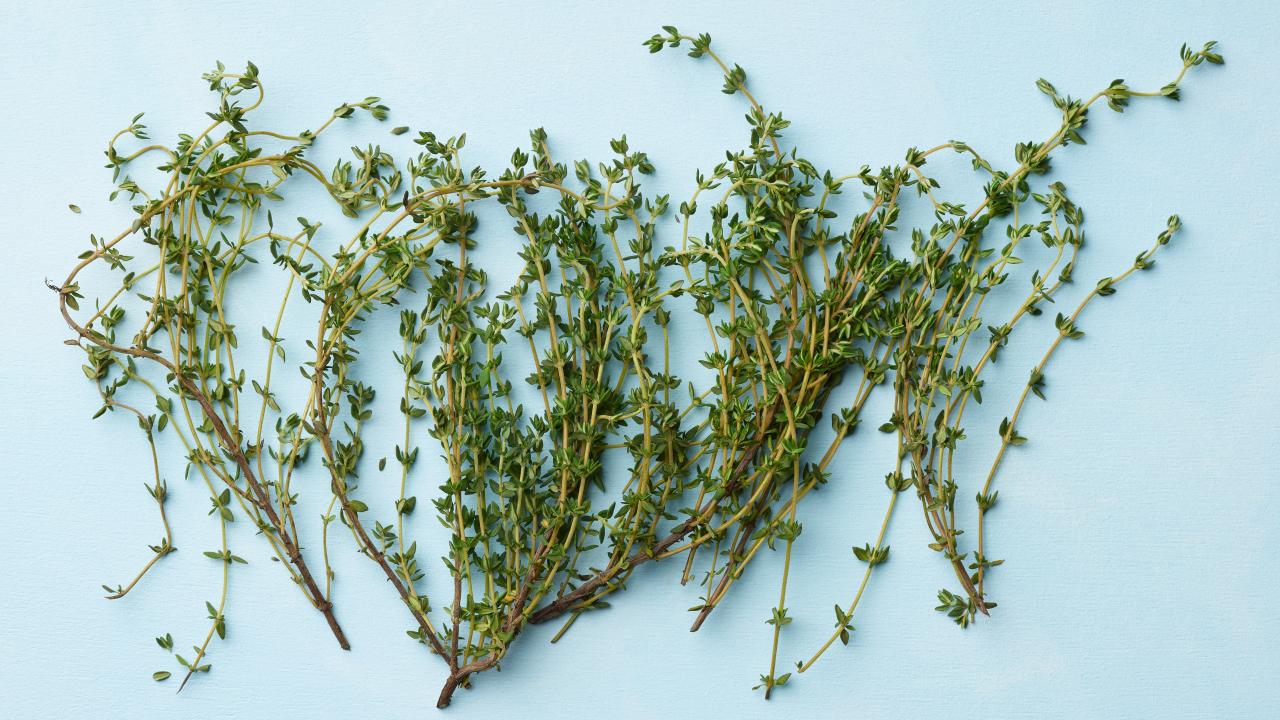
Thyme is more than just a kitchen staple; it's a herb with a rich history and surprising benefits. Ever wondered why ancient Egyptians used thyme in embalming rituals? Or how this tiny herb can boost your immune system? Thyme has been cherished for centuries, not just for its aromatic flavor but also for its medicinal properties. From ancient Greece to modern kitchens, this versatile herb has found its way into various cultures and cuisines. Whether you're a budding chef or a history buff, these 25 facts about thyme will leave you amazed. Ready to spice up your knowledge? Let's dive into the world of thyme!
Key Takeaways:
- Thyme has a rich history and was used by ancient Egyptians, Greeks, and Romans for its preservative and aromatic properties. It's not just a herb for cooking, but also for warding off nightmares and promoting restful sleep.
- Thyme is not only a flavorful herb for cooking, but also has medicinal benefits. It contains compounds with antiseptic and antioxidant properties, and can be grown easily in gardens or pots with minimal care.
What is Thyme?
Thyme is a small, perennial herb known for its aromatic leaves and culinary uses. It belongs to the mint family and has been cherished for centuries for its medicinal and culinary properties. Let's dive into some fascinating facts about this versatile herb.
Historical Significance of Thyme
Thyme has a rich history that spans across various cultures and eras. Its significance goes beyond just flavoring dishes.
- Ancient Egyptians used thyme in the embalming process due to its preservative properties.
- In Ancient Greece, thyme symbolized courage and was often burned as incense in temples.
- Romans believed thyme could purify rooms and added it to their baths for its aromatic qualities.
- During the Middle Ages, thyme was placed beneath pillows to ward off nightmares and promote restful sleep.
- Knights in medieval times received thyme as a gift from ladies, symbolizing bravery in battle.
Culinary Uses of Thyme
Thyme's robust flavor makes it a staple in many kitchens around the world. Its versatility in cooking is unmatched.
- Thyme is a key ingredient in the French herb blend, Herbes de Provence.
- It pairs exceptionally well with poultry, lamb, and fish dishes.
- Thyme is often used in soups, stews, and sauces to enhance flavor.
- Fresh thyme can be used in marinades to tenderize meat and add depth to the taste.
- Thyme-infused oils and vinegars are popular for adding a subtle hint of flavor to salads and dressings.
Medicinal Properties of Thyme
Beyond the kitchen, thyme has been valued for its medicinal benefits. Its health-boosting properties are well-documented.
- Thyme contains thymol, a compound with strong antiseptic and antifungal properties.
- It has been used traditionally to treat respiratory issues like bronchitis and coughs.
- Thyme tea is known to soothe sore throats and alleviate digestive problems.
- The herb has antioxidant properties that help in reducing inflammation.
- Thyme oil is used in natural remedies for skin conditions like acne and eczema.
Growing Thyme
Thyme is not only useful but also easy to grow. Whether in a garden or a pot, it thrives with minimal care.
- Thyme prefers well-drained soil and plenty of sunlight.
- It is drought-resistant, making it a low-maintenance herb for gardeners.
- Thyme can be propagated from seeds, cuttings, or by dividing established plants.
- Regular pruning encourages bushier growth and prevents the plant from becoming woody.
- Thyme attracts beneficial insects like bees, which help in pollination.
Interesting Facts About Thyme
Thyme has some unique characteristics and uses that might surprise you. These lesser-known facts highlight its versatility.
- There are over 300 varieties of thyme, each with its own distinct flavor and aroma.
- Thyme has been used in natural insect repellents due to its strong scent.
- It is a natural preservative and was used to preserve meat before refrigeration was available.
- Thyme is often used in aromatherapy for its calming and stress-relieving effects.
- The herb has been mentioned in literature and folklore, symbolizing everything from courage to elegance.
Thyme: A Herb Worth Knowing
Thyme's more than just a kitchen staple. This herb has a rich history, from ancient Egypt to modern medicine. Its antioxidant properties make it a health booster, while its essential oils are used in aromatherapy. Thyme's versatility extends to gardening, where it acts as a natural pest repellent. Plus, it's easy to grow, making it a favorite for home gardeners.
Cooking with thyme adds depth to dishes, whether it's roasted meats, soups, or stews. Its medicinal uses, like soothing coughs and boosting immunity, are backed by science. Even in the world of mythology, thyme symbolized bravery and courage.
So, next time you sprinkle thyme on your meal, remember you're adding a dash of history, health benefits, and a touch of nature's magic. This humble herb truly deserves a spot in your garden and kitchen.
Frequently Asked Questions
Was this page helpful?
Our commitment to delivering trustworthy and engaging content is at the heart of what we do. Each fact on our site is contributed by real users like you, bringing a wealth of diverse insights and information. To ensure the highest standards of accuracy and reliability, our dedicated editors meticulously review each submission. This process guarantees that the facts we share are not only fascinating but also credible. Trust in our commitment to quality and authenticity as you explore and learn with us.


